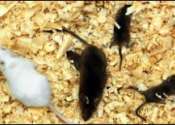For worms, positive thinking is the key to finding food
Caenorhabditis elegans, a tiny roundworm, spends much of its lifetime searching for soil bacteria to eat. This humble creature possesses 302 neurons, which may not seem like a lot compared to the billions of nerve cells that ...








